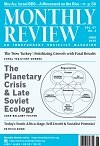Volume 67, Issue 02 (June)

In two Monthly Review special issues, “Education Under Fire: The U.S. Corporate Attack on Students, Teachers, and Schools” (July-August 2011) and “Public School Teachers Fighting Back” (June 2013), we sounded an alarm regarding the rapid restructuring and privatization of U.S. K–12 public schools. In terms of the scale of nationwide restructuring, the corporate takeover of education is unprecedented in modern U.S. history. The closest comparison we can come up with is the destruction of the street car systems across the United States and the building of the interstate highway system—in which freeways went right through cities for the first time, often in the face of neighborhood and community resistance. With respect to K–12 education, unimaginable amounts of private funds have gone into pressuring and corrupting government at every level, while the control mechanisms of the new educational system are increasingly left in private, not public, hands. The Common Core Standards and related high-stakes tests are at the center of this new system, and are the product of private corporate groups outside the direct reach of government. | more…
Soviet ecology presents us with an extraordinary set of historical ironies. On the one hand, the USSR in the 1930s and ’40s violently purged many of its leading ecological thinkers and seriously degraded its environment in the quest for rapid industrial expansion. The end result has often been described as a kind of “ecocide,” symbolized by the Chernobyl nuclear accident, the assault on Lake Baikal, and the drying up of the Aral Sea, as well as extremely high levels of air and water pollution. On the other hand, the Soviet Union developed some of the world’s most dialectical contributions to ecology, revolutionizing science in fields such as climatology, while also introducing pioneering forms of conservation. Aside from its famous zapovedniki, or nature reserves for scientific research, it sought to preserve and even to expand its forests. | more…
The fast-reviving South African left is urgently coming to grips with the most acute national crises of structure and agency the country has experienced since the historic freeing of Nelson Mandela in February 1990 and the shift of the entire body politic in favor of the African National Congress (ANC) and the South African Communist Party (SACP).… The subsequent rise in unemployment, inequality, poverty, and environmental degradation soon reached some of the worst levels in the contemporary world. The consequent social unrest is now so high that President Jacob Zuma…promised increased “public order policing” personnel and the purchase of a new generation of technologically advanced weapons, including sonar canons…. In this conflagration, what survived of the left is now growing by leaps and bounds. Within a decade, it may become a force capable of an electoral challenge to the ANC for state power. But much will depend upon how it regroups amidst shards of splintered radical projects, with myriad questions hotly debated in the movement. | more…
Turkey’s ruling party has turned the country, which it calls “the new Turkey,” into a capitalist nightmare: a triad of neoliberal economics, political despotism, and Islamist conservatism. This article provides an overview of neoliberalism in Turkey, then looks at the government’s extraction policies, highlighting the Soma mine massacre as one tragic example of the destructive policies of the governing party, the Adalet ve Kalkınma Partisi (AKP, Justice and Development Party). It also examines the extreme authoritarianism of President Recep Tayyip Erdoğan (formerly prime minister), and the growing cultural-relgious conservatism, which the AKP has interlaced with Islamist rhetoric. This hegemonic triad of neoliberalism, despotism, and conservatism is an especially dangerous one. However, it is being increasingly criticized, and resistance movements against neoliberal policies are growing. All of this gives some hope for Turkey’s future. | more…
Reflections on a Movement on the Rise
Rich Wiles, editor, Generation Palestine (London: Pluto Press, 2013), 256 pages, $24, paperback.
When in March 2012, Barack Obama paused briefly from approving orders for drone killings of Pakistani and Yemeni villagers, in order to reassure the attendees at the annual gala of the AIPAC (American-Israel Public Affairs Committee) that, “when there are efforts to boycott or divest from Israel, we will stand against them,” the real target of his declaration was elsewhere: the myriad grassroots organizers across the world who have made the global Boycott, Divestment, and Sanctions (BDS) campaigns unignorable. Their mounting influence has provoked efforts to declare them anti-Semitic or illegal from London to Long Beach. In fact, the series of victories across the University of California system has so annoyed its managers that they have hauled in the Caesar of domestic repression, Janet Napolitano, to deal with campus activists. Obama’s declaration of support for Israeli colonialism had a simple message to those many activists: back down, because Washington will not. | more…
